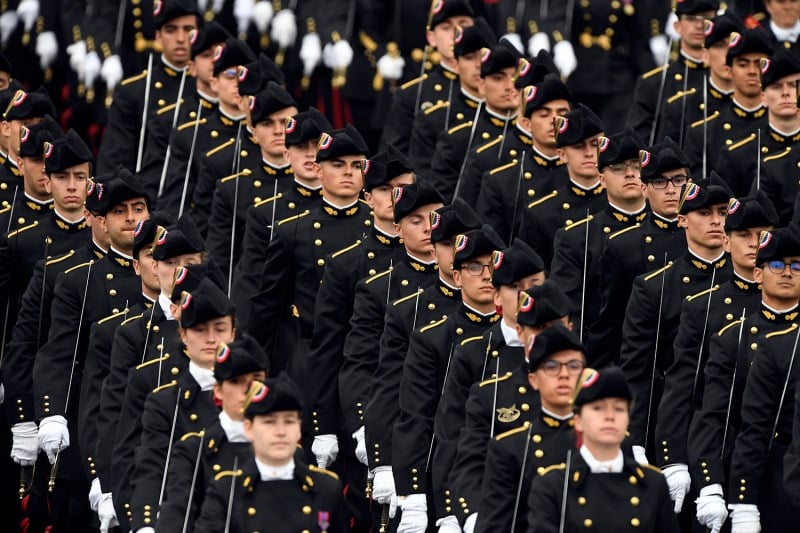U.S. Allies Adjust Travel Advisories Amid Trump Immigration Crackdowns

U.S. Allies Adjust Travel Advisories Amid Trump Immigration Crackdowns
Allies are keeping a closer eye on how their citizens are treated when they travel to the United States in the wake of recent detentions and deportations.
A U.S. Customs and Border Protection agent checks documents at the San Ysidro port in California on Oct. 2, 2019. Sandy Huffaker/AFP via Getty Images
The Trump administration’s hard-line approach to immigration is raising concerns among key allies and leading them to keep a closer eye on how their citizens are treated when they travel to the United States in the wake of recent detentions and deportations.
Germany updated its advice for travelers heading to the United States this week, underscoring that a visa or entry waiver does not guarantee automatic entry. “The final decision on whether a person can enter the U.S. lies with the US border authorities,” a spokesperson for the German foreign ministry said, per Reuters. But they also clarified that the update did not represent a formal travel warning.
The Trump administration’s hard-line approach to immigration is raising concerns among key allies and leading them to keep a closer eye on how their citizens are treated when they travel to the United States in the wake of recent detentions and deportations.
Germany updated its advice for travelers heading to the United States this week, underscoring that a visa or entry waiver does not guarantee automatic entry. “The final decision on whether a person can enter the U.S. lies with the US border authorities,” a spokesperson for the German foreign ministry said, per Reuters. But they also clarified that the update did not represent a formal travel warning.
The update comes after several German citizens, including a U.S. green card holder, were recently detained by immigration authorities in the United States. The German government this week said it’s monitoring the situation and working to determine whether U.S. immigration policy has been changed.
Foreign nationals from France, Canada, and the United Kingdom have also been detained in the United States in recent weeks. The individuals in all these cases appear to have attempted to enter the United States legally, raising questions as to why they ended up in detention centers. Some were detained for weeks and were reportedly subjected to aggressive interrogations, though U.S. immigration authorities have rejected those claims.
The U.K. has also updated its travel advice for citizens heading to the United States. The adjusted advisory warns that U.S. authorities are “strictly” enforcing entry rules and that those who break them “may be liable to arrest or detention.” The British Embassy in Washington did not immediately respond to a request for comment.
A French government minister also spoke out this week in relation to a scientist who was recently blocked from entering the United States while traveling to a conference near Houston. The French scientist was barred from entry and subsequently deported by U.S. authorities after they discovered text messages on his phone that were critical of U.S. President Donald Trump’s policies on academic research, according to Philippe Baptiste, France’s minister for higher education and research.
“Freedom of opinion, free research, and academic freedom are values we will continue to proudly uphold. I will defend the right for all French researchers to be faithful to them, while respecting the law,” Baptiste said.
Trump’s efforts to clamp down on immigration has led to an escalating showdown with the courts, and critics are now accusing the president of sparking a constitutional crisis.
Though U.S. immigration policy and enforcement has long been a source of controversy both domestically and internationally—often leading to criticism from rights groups and the United Nations—citizens of close allies are generally not expected to have an especially difficult time entering the country if they have the proper documentation. But this appears to be shifting under the Trump administration, and it could have far-reaching consequences—including a potential decline in tourism to the United States, which is already expected to be impacted by tariffs, among other issues.
The Department of Homeland Security did not immediately respond to a request for comment.
This post is part of FP’s ongoing coverage of the Trump administration. Follow along here.
John Haltiwanger is a reporter at Foreign Policy. X: @jchaltiwanger
More from Foreign Policy
-

Periodic table The Periodic Table of States
The org chart for a post-Westphalian world.
-

French Emperor Napoleon Bonaparte leads the final assault by the Imperial Guard before his defeat at the Battle of Waterloo in what is today Belgium, on June 18, 1815. The Cost of Ignoring Geopolitics
Like Napoleon and the Ming dynasty, Europe is paying the price for strategic blindness.
-

Donald Trump holds solar eclipse glasses. What I Got Wrong About Trump’s Second Term
I didn’t entirely see this coming. Here’s why.
-

A woman walks past an advertisement for the Russian army at a bus stop. Russia Is Only Winning Inside Trump’s Head
As Russians will tell you, the reality on the ground looks very, very different.









Join the Conversation
Commenting on this and other recent articles is just one benefit of a Foreign Policy subscription.
Already a subscriber?
.
Subscribe
Subscribe
View Comments
Join the Conversation
Join the conversation on this and other recent Foreign Policy articles when you subscribe now.
Subscribe
Subscribe
Not your account?
View Comments
Join the Conversation
Please follow our comment guidelines, stay on topic, and be civil, courteous, and respectful of others’ beliefs.
Change your username |
Log out
Change your username:
CANCEL
Confirm your username to get started.
The default username below has been generated using the first name and last initial on your FP subscriber account. Usernames may be updated at any time and must not contain inappropriate or offensive language.